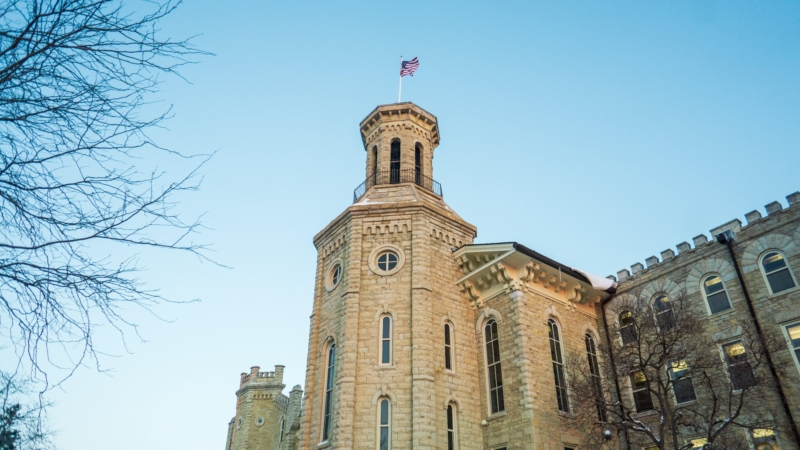How Veritas Prepared me for College

“The settled happiness and security which we all desire, God withholds from us by the very nature of the world: but joy, pleasure, and merriment, He has scattered broadcast. We are never safe, but we have plenty of fun, and some ecstasy. It is not hard to see why. The security we crave would teach us to rest our hearts in this world and oppose an obstacle to our return to God: a few moments of happy love, a landscape, a symphony, a merry meeting with our friends, a bathe or a football match, have no such tendency. Our Father refreshes us on the journey with some pleasant inns, but will not encourage us to mistake them for home.” —C. S. Lewis, The Problem of Pain (New York: HarperCollins Publishers, 1944), 116.
On these temperamental fall mornings at Wheaton College, I find myself briskly walking to a seminar on St. Thomas Aquinas which thus far has been in the round outside, where most philosophy should be done. At chapel, our community wades through the issues families must face in the integration of faith and the world. I make my way to my next class across the quad chatting with a good friend, we pass through the new music conservatory, and I fleetingly question whether I should have been a music major, but alas, it is time for Greek where we are digging into Luke 15. It is a brilliantly sunny day and has yet to plummet into the brutal Chicago winter, so I attend my final class outside again, a Phenomenology seminar, to discuss our first personal experience of eating ice cream. I end the day reading a poster for a homecoming presentation, compiling the research I did over the summer on a fascinating chromium complex, and preparing a sublime Bach suite for my cello.
Many of these activities are probably recognizable to those of you encapsulated in the realm of classical education: reading philosophy and theology, scientific inquiry, musical performance, and the study of a dead language. While I may not be in an explicitly classical university, I still find myself running around, engaged in living - put simply - a life of inescapable inquiry into wonder.
David Hume writes in his wonderfully titled An Enquiry Concerning Human Understanding: “Those, who delight in the discovery and contemplation of final causes, have here ample subject to employ their wonder and admiration.”1 These final causes are more often than not the aim of our education. To be thoroughly Augustinian, they order our loves towards God’s goodness. And so, this classical mode of education does indeed provide “ample subject to employ [our] wonder and admiration.” Veritas prepared me academically and socially for college so that I could participate more fully in this wonder. As a Chemistry and Philosophy double major, hopefully, I can speak to that preparation in both the humanities and the sciences.
In the humanities, the Omnibus curriculum aided me in building a foundation to navigate different worldviews, read with greater comprehension, and a desire to ask better questions of the text. The breadth of the curriculum gave me broad narratives with which I can now grasp worldviews and build frameworks of understanding. When I am able to situate myself in the worldview of Edmund Husserl, a news article, or my wife, I become more considerate and nuanced in the ways I argue and interact. As for reading, in one of my first college classes, the professor boldly proclaimed: “I have a good inkling that you lot haven’t learned to read properly!”
He was right, I had not learned many techniques for reading and certain ways to outline an argument, but I did comprehend what I was reading on a different level. This prepared me well to take on heavier reading loads and engage in discussions in a more meaningful way. When you engage with a text meaningfully, you invariably ask questions. While at Veritas, the discussion questions modeled what I should be asking, for example: What are the implications of this line of thought? Does this premise hold? How does this position interact with my faith? These questions are all a part of pursuing the wonder in our world.
Scientifically, the mathematical foundation that Veritas provides aided me tremendously in my study of chemistry. I needed to utilize calculus heavily in physical chemistry, and rely on algebra constantly. Admittedly, I was not prepared for the workload involved in all of the in-person labs. Yet, Veritas helped me to be methodical in my problem solving, and gave me a desire to be precise in the way I work with my hands. My scientific studies at Veritas emboldened me to ask why my experiments did not work, and developed in me a willingness to ask for help as I passionately sought to understand the chemical processes going on in my bubbling flask.
I began with a sketch of a day I might have, invariably, these days are wrought with community. One of my favorite lines from Hume says: “Be a philosopher; but amidst all your philosophy, be still a man.”2 Fully cultivated personhood involves community, and community was something I fought for at Veritas. All of the joy and disappointment one should expect in a relationship was there and many deep friendships. The kinds of people learning with me at Veritas were the people I desired friendships with. At Wheaton, I have now cultivated deep friendships uncompromising in our desires for truth. I have soaked up relationships with professors and classmates in ways I am not sure I would have had I not been online.
I am grateful for the education I received at Veritas. It grew me and shaped me, not simply as an academic, but as a friend, son, and husband. I am in a position to “get my money’s worth” out of my college education. Recently, I have rediscovered a truth that I learned while at Veritas, I cannot functionally learn for a grade. Our God is not one who desires our stress on that success. He desires our worship, and at least for myself, a life of inescapable inquiry into wonder is a way to worshipful learning. It is this refreshing way that Veritas helped me to cultivate, but is ultimately something founded on the grace I have first been shown. So, brothers and sisters at Veritas, I leave you with this: whether we are the educators, students, or the ones raising the students, do so with a wonder founded on the grace you have been shown. This is an imperfect act, but new creation is coming, so uncover it well.
--
References:
1. David Hume, An Enquiry Concerning Human Understanding: A Letter from a Gentleman to His Friend in Edinburgh U.a. (Indianapolis u.a.: Hackett, 1993), 36.
2. Ibid., 4.
Eli Driskill is a 2018 graduate of Veritas Scholars Academy and a senior at Wheaton College where he is studying with his wife, Katie. He is working towards a double major in Chemistry and Philosophy, and plans to continue with graduate work in Philosophy of Science and Ethics.






